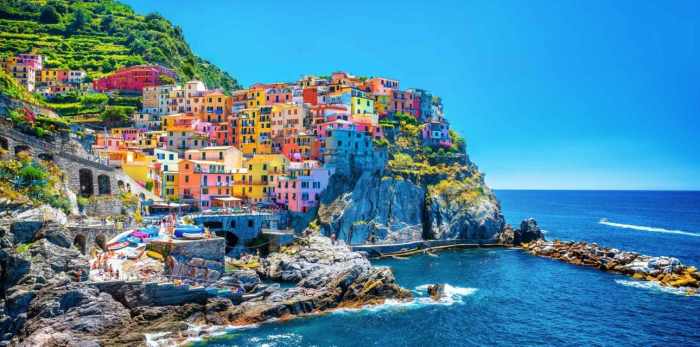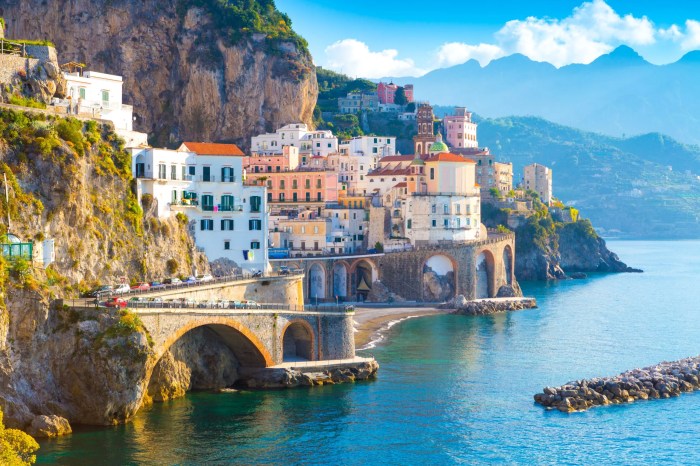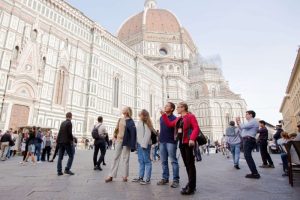
Immerse yourself in the captivating world of Cultural Tours in Italy, where history, art, and traditions intertwine to create a unique and enriching travel experience. From iconic landmarks to mouthwatering cuisine, discover the essence of Italy through a cultural lens.
Embark on a journey filled with centuries-old treasures and vibrant cultural tapestries that showcase the heart and soul of Italy, inviting you to delve into its rich tapestry of art, architecture, and culinary delights.
CULTURAL TOURS
Cultural tours in Italy offer a unique opportunity to explore the country’s rich history, art, architecture, and culinary traditions, providing visitors with a deeper understanding and appreciation of Italy’s cultural heritage.
Types of Cultural Tours
- Art-Focused Tours: These tours often include visits to renowned museums such as the Uffizi Gallery in Florence or the Vatican Museums in Rome, showcasing masterpieces by artists like Michelangelo, Leonardo da Vinci, and Botticelli.
- Historical Tours: Explore ancient ruins like the Colosseum in Rome, Pompeii near Naples, or the Greek temples in Sicily, delving into Italy’s fascinating past.
- Culinary Tours: Experience the diverse and delicious flavors of Italian cuisine through food and wine tastings, cooking classes, and visits to local markets and vineyards.
- Architecture Tours: Discover the stunning architectural wonders of Italy, from the iconic Leaning Tower of Pisa to the historic palaces and churches found throughout the country.
Significance of Cultural Tours
Cultural tours play a crucial role in preserving Italy’s cultural identity and traditions by educating visitors about the country’s history, art, and cuisine. By immersing themselves in Italy’s cultural heritage, tourists can gain a deeper appreciation for the significance of preserving these traditions for future generations.
POPULAR DESTINATIONS
Italy is home to a plethora of popular cultural tour destinations that offer a rich tapestry of history, art, and architecture. Let’s explore some of the must-visit destinations that showcase the country’s cultural heritage.
Rome
Rome, the capital of Italy, is a treasure trove of ancient ruins, majestic churches, and world-renowned art. The city is steeped in history, with iconic landmarks such as the Colosseum, Roman Forum, and Pantheon.
- The Vatican City, an independent city-state within Rome, is the seat of the Catholic Church and home to St. Peter’s Basilica and the Sistine Chapel.
- The Spanish Steps, Trevi Fountain, and Piazza Navona are popular gathering spots showcasing Baroque architecture and vibrant street life.
Florence
Florence, the birthplace of the Renaissance, is renowned for its art and architecture. The city is home to masterpieces by Michelangelo, Leonardo da Vinci, and Botticelli.
- The Uffizi Gallery houses an impressive collection of Renaissance art, including works by Raphael, Titian, and Caravaggio.
- The iconic Duomo, with its distinctive dome designed by Brunelleschi, dominates the Florence skyline and offers panoramic views of the city.
Venice
Venice is a unique city built on a network of canals, known for its picturesque bridges, palaces, and gondolas. The city’s rich history as a maritime power is reflected in its architecture and art.
- The Grand Canal, lined with elegant palazzos and churches, is the main thoroughfare of Venice and a popular route for gondola rides.
- The iconic St. Mark’s Square, with its Byzantine-inspired St. Mark’s Basilica and Campanile, is a bustling hub of activity and a must-visit cultural attraction.
Pompeii
Pompeii, a Roman city buried by the eruption of Mount Vesuvius in 79 AD, offers a fascinating glimpse into ancient life. The well-preserved ruins provide insight into daily activities, art, and architecture of the time.
- The Forum, thermal baths, and amphitheater are key attractions in Pompeii, showcasing the advanced engineering and urban planning of the ancient Romans.
- The Villa of the Mysteries, with its vivid frescoes depicting mysterious rituals, is a highlight for art enthusiasts visiting Pompeii.
Sicily
Sicily, the largest island in the Mediterranean, is a melting pot of cultures and civilizations. The island’s diverse history is reflected in its architecture, cuisine, and traditions.
- The Valley of the Temples in Agrigento is a UNESCO World Heritage Site featuring well-preserved Greek temples overlooking the sea.
- The historic city of Palermo offers a mix of Arab, Norman, and Baroque architecture, with landmarks such as the Palermo Cathedral and the Royal Palace.
ART AND ARCHITECTURE

Art and architecture play a pivotal role in Italian culture, shaping the identity of the country and influencing artistic movements worldwide. Italy is renowned for its rich artistic heritage, from the Renaissance masters to modern-day architects pushing the boundaries of design.
Famous Italian Artists and Architects
Italian artists like Leonardo da Vinci, Michelangelo, and Raphael are celebrated for their groundbreaking contributions to art. Architects like Andrea Palladio and Renzo Piano have left a lasting impact on the architectural landscape with their innovative designs.
Iconic Landmarks in Italy
Italy boasts a plethora of iconic art and architectural landmarks that attract cultural tour enthusiasts from around the globe. The Colosseum in Rome, the Duomo in Florence, and the Sistine Chapel in Vatican City are just a few examples of must-see destinations for art and architecture lovers.
Art Styles and Architectural Features
Italy’s diverse art styles, ranging from the intricate details of Baroque to the simplicity of Renaissance, showcase the country’s artistic evolution over the centuries. Architectural features like ornate facades, grand domes, and intricate frescoes are characteristic of Italian design, making Italy a hub for cultural exploration and inspiration.
LOCAL CUISINE AND TRADITIONS

Italian culture places a strong emphasis on food and traditions, with meals often serving as a central gathering point for families and communities. The role of food goes beyond just nourishment; it is a way to connect with others, celebrate special occasions, and pass down centuries-old traditions.Local cuisine plays a significant role in enhancing the cultural tour experience in Italy, as it provides a deeper understanding of the history, customs, and values of each region.
By tasting traditional dishes, visitors can immerse themselves in the local way of life and appreciate the rich culinary heritage that has been preserved for generations.
Popular Traditional Italian Dishes
- Pasta Carbonara (Lazio): A creamy pasta dish made with eggs, cheese, pancetta, and black pepper.
- Pizza Margherita (Campania): A classic pizza topped with tomato sauce, mozzarella, fresh basil, and olive oil.
- Risotto alla Milanese (Lombardy): A saffron-infused risotto dish that is creamy and flavorful.
- Osso Buco (Lombardy): Braised veal shanks cooked with vegetables, white wine, and broth.
Culinary Experiences and Food Tours
Italy offers a wide range of culinary experiences and food tours that showcase the country’s diverse gastronomy. From wine tastings in Tuscany to olive oil tours in Umbria, visitors can explore the unique flavors and ingredients of each region. Cooking classes, market tours, and farm visits are also popular options for those looking to delve deeper into Italian cuisine and traditions.
As we conclude our exploration of Cultural Tours in Italy, we leave you with a newfound appreciation for the profound impact of cultural immersion in unraveling the mysteries and wonders of this historically rich and artistically diverse country. Plan your next adventure to Italy, where every cobblestone street and ancient monument tells a story waiting to be discovered.
Frequently Asked Questions
What types of cultural tours are available in Italy?
Italy offers a diverse range of cultural tours, including art-focused tours, historical tours, culinary tours, and more, each providing a unique perspective on the country’s rich heritage.
Which are some popular destinations for cultural tours in Italy?
Popular cultural tour destinations in Italy include Rome, Florence, Venice, Pompeii, and Sicily, each offering a blend of historical significance and cultural treasures waiting to be explored.
How does local cuisine enhance the cultural tour experience in Italy?
Local cuisine plays a vital role in cultural tours by offering insights into Italian traditions and regional flavors, providing a sensory journey that complements the overall cultural experience.





